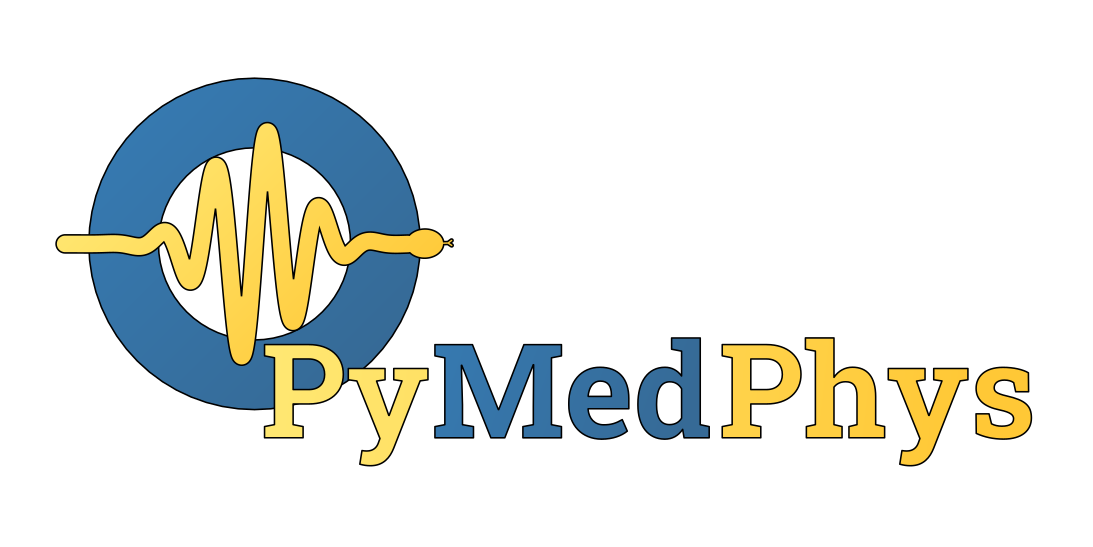Medical Physics library
Project description
A community effort to develop an open standard library for Medical Physics in Python. Building quality transparent software together via peer review and open source distribution. Open code is better science.
What is PyMedPhys?
An open-source Medical Physics python library with a focus on being a place to share, review, improve, and transparently learn off of each other’s code. It is inspired by the collaborative work of our physics peers in astronomy and their Astropy Project. PyMedPhys is available on PyPI and GitHub.
Mailing list
If you would like to dive into the community a great place to get started is to sign up to the mailing list and say hi by introducing yourself with where you’re from, and what you hope to achieve with PyMedPhys.
Table of contents
Tutorials
Get started with a hands-on introduction to PyMedPhys for beginners
How-To guides
Guides and recipes for common problems and tasks
Reference
Technical reference for the library (modules, functions and classes), as well as the available command line tools.
Background
Explanation and discussion of key topics and concepts
Beta level of development
PyMedPhys is currently within the beta stage of its life-cycle. It will stay in this stage until the version number leaves 0.x.x and enters 1.x.x. While PyMedPhys is in beta stage, no API is guaranteed to be stable from one release to the next. In fact, it is very likely that the entire API will change multiple times before a 1.0.0 release. In practice, this means that upgrading pymedphys to a new version will possibly break any code that was using the old version of pymedphys. We try to be abreast of this by providing details of any breaking changes from one release to the next within the Release Notes.
Our Team
PyMedPhys is what it is today due to its contributors. Core contributors and contributors who have been active in the last six months as well as their respective employers are presented below.
Core contributor(s)
- Simon Biggs
Riverina Cancer Care Centre, Australia
Active contributors
- Matthew Jennings
Royal Adelaide Hospital, Australia
- Phillip Chlap
University of New South Wales, Australia
South Western Sydney Local Health District, Australia
- Pedro Martinez
University of Calgary, Canada
Tom Baker Cancer Centre, Canada
- Jacob McAloney
Riverina Cancer Care Centre, Australia
- Matthew Cooper
University of Sydney, Australia
- Stuart Swerdloff
New Zealand
Past contributors
Project details
Release history Release notifications | RSS feed
Download files
Download the file for your platform. If you're not sure which to choose, learn more about installing packages.
Source Distribution
Built Distribution
File details
Details for the file pymedphys-0.33.0.dev1.tar.gz.
File metadata
- Download URL: pymedphys-0.33.0.dev1.tar.gz
- Upload date:
- Size: 466.7 kB
- Tags: Source
- Uploaded using Trusted Publishing? No
- Uploaded via: poetry/1.0.10 CPython/3.7.8 Linux/5.4.0-45-generic
File hashes
| Algorithm | Hash digest | |
|---|---|---|
| SHA256 | 571d7b68a8e4a39ca9fcfbcc268c239de1925e66345afafcf2a1de0f515abb17 |
|
| MD5 | 03eb48111efb07cb791f15b5c3b6e073 |
|
| BLAKE2b-256 | 4c41a6ecdfbdc3116b039c75d5eae1b7fcfdb13481eb225cd79e101b48a8a359 |
File details
Details for the file pymedphys-0.33.0.dev1-py3-none-any.whl.
File metadata
- Download URL: pymedphys-0.33.0.dev1-py3-none-any.whl
- Upload date:
- Size: 639.7 kB
- Tags: Python 3
- Uploaded using Trusted Publishing? No
- Uploaded via: poetry/1.0.10 CPython/3.7.8 Linux/5.4.0-45-generic
File hashes
| Algorithm | Hash digest | |
|---|---|---|
| SHA256 | 5f4c85a9d4fb9c8a904e3d1fa052dd69d9e97a48473fd204afad46a41535b8b2 |
|
| MD5 | 8a91bae45cb754a9593c3f01bc4982d5 |
|
| BLAKE2b-256 | 9ca858a2c822f01d0d4ca0d3b73ce326d6157b19bf6924f72172bd52b4e73789 |
























